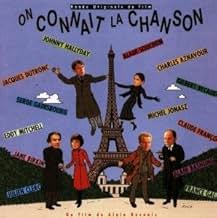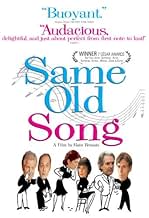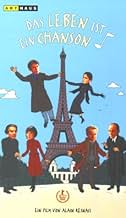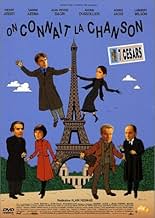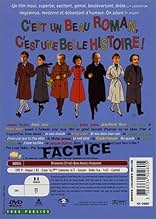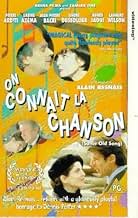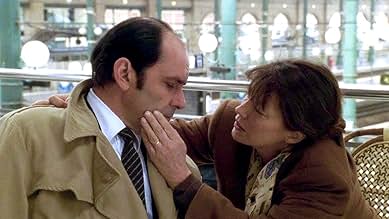On connaît la chanson
- 1997
- 2h
CALIFICACIÓN DE IMDb
7.3/10
4.6 k
TU CALIFICACIÓN
Una historia musical sobre cómo se puede encontrar el amor en las calles del hermoso París.Una historia musical sobre cómo se puede encontrar el amor en las calles del hermoso París.Una historia musical sobre cómo se puede encontrar el amor en las calles del hermoso París.
- Dirección
- Guionistas
- Elenco
- Premios
- 10 premios ganados y 9 nominaciones en total
- Dirección
- Guionistas
- Todo el elenco y el equipo
- Producción, taquilla y más en IMDbPro
Opiniones destacadas
The films central theme, that of having characters break into lip-synced song and dance routines, is not original and indeed the film introduction acknowledges the debt to the UK playwright Dennis Potter. The plot of the film is enjoyable in a light hearted way and the characters well drawn and played. As a English speaker I assume that we lose something of the effect as the songs chosen are not familiar to us as no doubt they would be to a native French viewer. What does irritate slightly I found is the overuse of the "break into song". Potter, if my memory is correct, uses it far more sparingly with a few larger set pieces. At points in this film the characters are breaking into song so often that it feels as if the plot will be broken too much. Definitely worth watching though for the performances.
In the unapproximate center of "On connaît la chanson," find a marvelous joke that missed by everyone at the sold out SFIFF screening I attended. If you want to try to catch it yourself, then don't read on! I'm writing to those of you who didn't or won't catch it. Four or five characters are seated chatting or arguing, I forget, round a table in a busy restaurant. As you know from other comments here, the script incorporates line fragments from well-known French songs (kind of like those "hidden picture" puzzles in the dentist office magazine). As each occurs, someone bursts into song. One of our group, after an unremarkable, perfectly conversational pause, says "je ne regret rien," then pauses, as does everyone else round the table. They look at one another, everyone at everyone, the very clatter of the restaurant seems to pause, waiting, and for the only time in this film, nobody takes the cue. Nobody breaks into the Piaf standard.
This film, a tribute to Dennis Potter (pennies from heaven, the singing detective), is the best french comedy I've ever seen. Basically it's a typical well-made french film about relations, with great acting, set in Paris. But it's more than that: it's also a musical. Here are some reasons why I think it's a great movie. First, the chansons, play-backed by the actors, are brilliant. Imagine a Wehrmachtofficer lipsinging to an Edith-Piaf chanson (in the opening act). The best thing about the chansons, is the fact that they actually support the story, as they serve as moments of reflection and introspection for the players. Maybe it's the contrast between the extreme sentimentality and the 'serious' acting that makes this film so great. Go see it.
Reminiscent of Jacques Demy's 1968 "The Young Girls of Rochefort" where characters now and then burst into song (and dance) to convey the story, and Eric Rohmer's flavor of intertwined relationships and coincidental meetings of characters that wrap around a tale, Alain Resnais' treatment here in 1997 "Same Old Song" has his characters burst into lines of songs in between dialogs. Irrespective of the mix and match of a male vocal coming out of a female character or vice versa, they are excerpted strains and words chosen from certain songs that propel the storytelling. It's as if the characters are thinking aloud in songs on the situation or predicament at hand. It is rather fun once you get a sense of what Resnais was trying to deliver. Being an Alain Resnais film, intellectual exchanges and philosophical tones are never lacking.
Definitely reminded me of his treatment on 1980 "Mon oncle d'Amerique" where he has scientific mice experiment scenes juxtaposed against the human (brain) reactions to relationships and love. In this 1997 "On connait la chanson", his fascination with how people think - how the brain cells work in each of the characters, is again deftly demonstrated. At the last segment, where a theoretical explosion of the minds occur as gray matters collide - there was an appearance of a graphical ear-shape (in quiet wavy motion) in the center of it all - it's amazing to see how Resnais' mind at 75 was still so very much into studying and unraveling human emotions, offering us life lessons in love.
The story centers around two sisters, Camille the tour guide who's also writing a thesis (Agnes Jaoui) and her popular and successful sibling Odile (Sobine Azema), and four men in their lives: an old flame of Odile - Nicolas (Jean-Pierre Bacri), husband of Odile - Claude (Pierre Arditi), writer of radio plays and quiet admirer of Camille - Simon (Andre Dussollier, more casually groomed than usual), and profiteering real-estate agent of Odile, fanciful beau of Camille and arrogant boss of Simon - Marc (Lambert Wilson).
Typographically oriented, I can't help noticing the sequence of treatment to the credit roll at the end of the film: it started with a centrifugal look of the names of les chanteurs, followed by horizontal scroll from right to left of the main cast and crew, then a quick shooting upwards to facilitate the conventional bottom to top scroll of rest of the credits.
It may not be a French film for just anybody, it certainly is delightful to experience. (An Artistic License and Merchant-Ivory Films production indeed!) The subtitles, translated by Ian Burley, were super: the lyrics actually rhyme in English, e.g., "resist", "exist", "egotist"!
This film was dedicated to Dennis Potter, a cerebral genius he was. Check out his 1996 "Karaoke" (a multitude of colorfully complex characters) and "Cold Lazarus" (quite a sci-fi notion not completely implausible) - both centers around Albert Finney being the main character, and as always, a tour de force performance Finney delivered.
Definitely reminded me of his treatment on 1980 "Mon oncle d'Amerique" where he has scientific mice experiment scenes juxtaposed against the human (brain) reactions to relationships and love. In this 1997 "On connait la chanson", his fascination with how people think - how the brain cells work in each of the characters, is again deftly demonstrated. At the last segment, where a theoretical explosion of the minds occur as gray matters collide - there was an appearance of a graphical ear-shape (in quiet wavy motion) in the center of it all - it's amazing to see how Resnais' mind at 75 was still so very much into studying and unraveling human emotions, offering us life lessons in love.
The story centers around two sisters, Camille the tour guide who's also writing a thesis (Agnes Jaoui) and her popular and successful sibling Odile (Sobine Azema), and four men in their lives: an old flame of Odile - Nicolas (Jean-Pierre Bacri), husband of Odile - Claude (Pierre Arditi), writer of radio plays and quiet admirer of Camille - Simon (Andre Dussollier, more casually groomed than usual), and profiteering real-estate agent of Odile, fanciful beau of Camille and arrogant boss of Simon - Marc (Lambert Wilson).
Typographically oriented, I can't help noticing the sequence of treatment to the credit roll at the end of the film: it started with a centrifugal look of the names of les chanteurs, followed by horizontal scroll from right to left of the main cast and crew, then a quick shooting upwards to facilitate the conventional bottom to top scroll of rest of the credits.
It may not be a French film for just anybody, it certainly is delightful to experience. (An Artistic License and Merchant-Ivory Films production indeed!) The subtitles, translated by Ian Burley, were super: the lyrics actually rhyme in English, e.g., "resist", "exist", "egotist"!
This film was dedicated to Dennis Potter, a cerebral genius he was. Check out his 1996 "Karaoke" (a multitude of colorfully complex characters) and "Cold Lazarus" (quite a sci-fi notion not completely implausible) - both centers around Albert Finney being the main character, and as always, a tour de force performance Finney delivered.
it's a simple funny film that talks about few people who know each other or get to know each other afterward. The aspect that makes it differ from other movies is that the protagonists sing often their feelings or ideas! The used songs are popular French songs that are well known by everybody in France. I liked it in general but it is not a plot that interests me that much since the most of these relations were not that interesting for me. The most important human aspect that was shown in this movie is that many things are not as they seem to be! Some people show that they are strong and have great achievements and they have everything under control but they are not that achieving! They have to accept that they are only normal people and show their true selves to the others.
¿Sabías que…?
- TriviaThe film is dedicated to the memory of Dennis Potter, and is in the style of Potter's lip-sync musicals like Pennies from Heaven (1978), The Singing Detective (1986) and Lipstick on Your Collar (1993).
- ConexionesFeatured in 6 à la maison: Episode dated 27 January 2021 (2021)
- Bandas sonorasJ'ai Deux Amours
Music by Vincent Scotto
Lyrics by Georges Koger and Henri Varna
Performed by Josephine Baker
Selecciones populares
Inicia sesión para calificar y agrega a la lista de videos para obtener recomendaciones personalizadas
- How long is Same Old Song?Con tecnología de Alexa
Detalles
- Fecha de lanzamiento
- Países de origen
- Sitio oficial
- Idiomas
- También se conoce como
- Same Old Song
- Locaciones de filmación
- Hôtel Meurice - 228 Rue de Rivoli, Paris 1, París, Francia(opening scene: Camille tells about von Choltitz in front of the hotel)
- Productoras
- Ver más créditos de la compañía en IMDbPro
Taquilla
- Presupuesto
- EUR 7,900,000 (estimado)
- Tiempo de ejecución
- 2h(120 min)
- Color
- Mezcla de sonido
- Relación de aspecto
- 1.85 : 1
Contribuir a esta página
Sugiere una edición o agrega el contenido que falta

